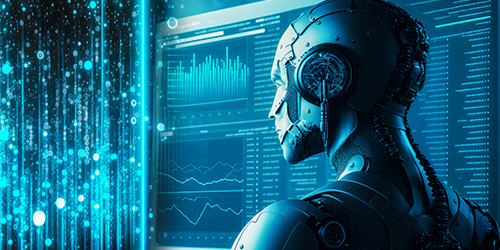
The rapid advancement of artificial intelligence (AI) has permeated nearly every facet of modern life, and the Information Technology (IT) industry is no exception. From automating repetitive tasks to analyzing massive datasets, AI is reshaping the IT landscape in unprecedented ways. As we stride towards an increasingly digital future, the convergence of AI and IT is predicted to hold a pivotal role. This article delves into the future of AI in the IT industry and the transformative changes we can anticipate.
1. Enhanced Cybersecurity
As cyber threats become increasingly sophisticated, AI is poised to play a critical role in enhancing cybersecurity. Machine learning algorithms can analyze patterns, learn from them, and detect unusual activity, thereby identifying potential security threats before they cause significant damage. Furthermore, AI can automate routine security tasks, freeing up time for IT professionals to focus on more strategic activities. The future of cybersecurity in the IT industry is bound to be intertwined with the evolution of AI.
2. Improved IT Operations
AI can significantly streamline IT operations through automation and predictive analytics. AI-driven automation can take over mundane tasks, such as system updates and password resets, allowing IT professionals to focus on more complex issues. Predictive analytics, on the other hand, can identify potential IT issues before they escalate, thereby improving system reliability and reducing downtime. AI is set to revolutionize IT operations, making them more efficient and proactive.
3. Software Development and Testing
AI is transforming the way software is developed and tested. AI-driven tools can automate parts of the coding process, detect bugs, and suggest improvements, making software development faster and more efficient. Furthermore, AI can significantly streamline the testing process by automating repetitive testing tasks and using predictive analytics to prioritize testing areas. AI’s role in software development and testing is expected to grow, leading to more efficient and reliable software products.
4. Advanced Data Analysis
AI’s ability to analyze massive datasets and uncover hidden patterns holds significant potential for the IT industry. Machine learning algorithms can sift through vast amounts of data, identifying trends and insights that human analysts might miss. This capability can inform decision-making, improve system performance, and even predict future trends. The future of data analysis in the IT industry is likely to be dominated by AI.
5. Enhanced Customer Support
AI is set to revolutionize customer support in the IT industry. AI-powered chatbots can handle routine queries, provide instant responses, and offer 24/7 support, leading to improved customer satisfaction. Furthermore, AI can analyze customer data to provide personalized support and recommendations. As AI becomes more sophisticated, it will play an increasingly prominent role in providing efficient, personalized customer support.
6. AI Ethics and Governance
As AI becomes more integral to the IT industry, ethical and governance issues will come to the forefront. Questions about data privacy, algorithmic bias, and accountability will need to be addressed. IT professionals will need to develop robust AI governance frameworks and ethical guidelines to ensure that AI is used responsibly and transparently.
In conclusion, the future of AI in the IT industry holds exciting possibilities. From enhanced cybersecurity and streamlined operations to advanced data analysis and improved customer support, AI is set to revolutionize the IT landscape. However, with these advancements come ethical and governance challenges that need to be addressed. As we step into the future, the IT industry will need to navigate these challenges and harness the power of AI responsibly and effectively.



